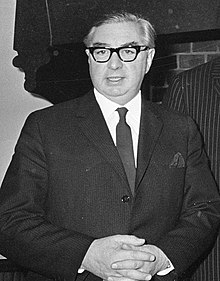
Back چورچ براون (سياسى من المملكه المتحده) ARZ George Brown, baron George-Brown Danish George Brown, Baron George-Brown German لرد جرج براون Persian George Brown (homme politique britannique) French George Brown NB George Brown (polityk) Polish George Brown Turkish
The Lord George-Brown | |
|---|---|
 Brown in 1967 | |
| Foreign Secretary | |
| In office 11 August 1966 – 15 March 1968 | |
| Prime Minister | Harold Wilson |
| Preceded by | Michael Stewart |
| Succeeded by | Michael Stewart |
| First Secretary of State | |
| In office 16 October 1964 – 11 August 1966 | |
| Prime Minister | Harold Wilson |
| Preceded by | Rab Butler (1963)[a] |
| Succeeded by | Michael Stewart |
| Secretary of State for Economic Affairs | |
| In office 16 October 1964 – 11 August 1966 | |
| Prime Minister | Harold Wilson |
| Preceded by | Office created |
| Succeeded by | Michael Stewart |
| Deputy Leader of the Labour Party | |
| In office 15 July 1960 – 19 June 1970 | |
| Leader |
|
| Preceded by | Aneurin Bevan |
| Succeeded by | Roy Jenkins |
| Leader of the Opposition | |
| In office 18 January 1963 – 14 February 1963 | |
| Monarch | Elizabeth II |
| Prime Minister | Harold Macmillan |
| Preceded by | Hugh Gaitskell |
| Succeeded by | Harold Wilson |
| Minister of Works | |
| In office 26 April 1951 – 26 October 1951 | |
| Prime Minister | Clement Attlee |
| Preceded by | Richard Stokes |
| Succeeded by | David Eccles |
| Member of Parliament for Belper | |
| In office 5 July 1945 – 29 May 1970 | |
| Preceded by | Herbert Wragg |
| Succeeded by | Geoffrey Stewart-Smith |
| Member of the House of Lords Lord Temporal | |
| In office 10 November 1970 – 2 June 1985 Life peerage | |
| Personal details | |
| Born | George Alfred Brown 2 September 1914 Lambeth, London, England |
| Died | 2 June 1985 (aged 70) Truro, Cornwall, England |
| Political party | |
| Spouse |
Sophie Levene
(m. 1937; sep. 1982) |
| Children | 2 |
a. ^ Office vacant from 18 October 1963 to 16 October 1964. | |
George Alfred George-Brown, Baron George-Brown,[2] PC (né Brown; 2 September 1914 – 2 June 1985), was a British Labour Party politician who served as Deputy Leader of the Labour Party from 1960 to 1970 and held several Cabinet roles under Prime Minister Harold Wilson, including Foreign Secretary and First Secretary of State.
After leaving school at the age of 15, Brown began work as a clerk, before joining the Transport and General Workers' Union. He rose quickly through the union ranks as an organiser, and shortly before the 1945 election he was chosen as the Labour Party candidate for the seat of Belper. He defeated the Conservative incumbent and went on to hold the seat until his own defeat at the 1970 election. He briefly served in the Attlee government as Minister of Works in 1951. After Labour lost office he was appointed to the Shadow Cabinet, and came to be regarded as a leader of the trade-union-supporting faction on the right of the Labour Party. Following the sudden death of Aneurin Bevan in 1960, Brown was successful in the election to replace him as Deputy Leader of the Labour Party.
Three years later, following the sudden death of Hugh Gaitskell, Brown became Acting Leader of the Labour Party, and consequently was briefly Leader of the Opposition. He stood in the election to gain the role permanently, but was beaten by Harold Wilson; one factor in his defeat was concern from colleagues about the impact of his well-known alcoholism, an affliction that remained with him through his life.[3] Following Labour's victory at the 1964 election, Wilson appointed Brown as First Secretary of State, making him the next-most senior member of the Cabinet, and appointed him to the new position of Secretary of State for Economic Affairs, in an ultimately unsuccessful attempt to curtail the power of HM Treasury.
Two months after Labour's landslide victory at the snap 1966 election, Wilson moved Brown to the role of Foreign Secretary, a job he had always coveted. Despite this, Brown continued to struggle with his alcoholism, and after several arguments with Wilson in 1968, the two agreed that Brown would resign. Brown lost his seat of Belper in 1970, and shortly thereafter was elevated to the House of Lords; he insisted, having always been known simply as "George Brown", that upon taking his peerage in November 1970 he would combine his first name and surname to create his title, Baron George-Brown, of Jevington in the County of Sussex.[1]
- ^ a b Cite error: The named reference
Oxford DNBwas invoked but never defined (see the help page). - ^ Cite error: The named reference
Gazettewas invoked but never defined (see the help page). - ^ Francis Wheen "BOOK REVIEW / Statesman who bottled out: 'Tired and Emotional: The Life of Lord George Brown' – Peter Paterson" Archived 24 September 2015 at the Wayback Machine, The Independent on Sunday, 9 May 1993
© MMXXIII Rich X Search. We shall prevail. All rights reserved. Rich X Search